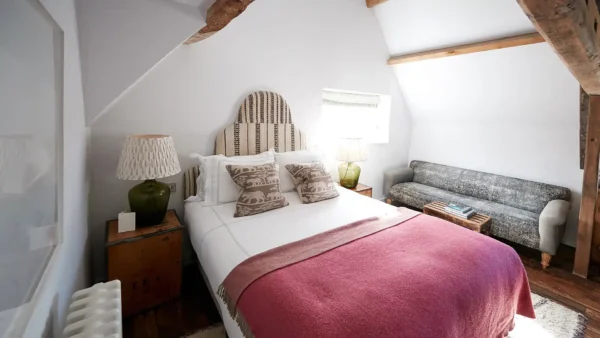Renting out your backyard pool might seem like a good way to make some extra income, but you should consider all the possible implications before doing so. It could leave you with no home insurance and huge legal bills.
First there was Airbnb in 2009, followed by Uber in 2012. A few years later came Uber Eats and the world would never be the same. The sharing economy continues to grow and evolve, and now the latest trend, which gained popularity during COVID-19 lockdowns, is pool sharing. Homeowners with backyard pools can now rent them out by the hour on sites like Swimply and, during the peak summer season, earn as much as $7,000 a month. This can be incredibly tempting, but comes with risks.
Am I covered by home insurance if I rent my pool?
There is no home insurance company currently operating in Ontario that will cover you for renting out your pool. Business activities are not usually covered by home insurance. Some homeowners policies are eligible for a business endorsement that includes coverage for things like liability and contents, but insurance companies are very specific about the types of home-based businesses they will accept, and even about whether or not clients can visit you at your house. (In most cases, this is not allowed.)
All this to say, this kind of coverage is not available for renting out your backyard pool, because insurance companies consider this an exceptionally risky activity.
What about the insurance offered by Swimply?
According to Swimply’s website, hosts are covered for up to $1 million in liability and $10,000 for property damage. This is not enough coverage. The rebuild cost of your home is likely somewhere between $300,000 and $1 million, so the property coverage is only for very minor damage that your guests could cause. What if they accidentally cause a leak that floods your basement, or leave a cigarette unattended and burn down your pool house? Even if you insist smoking is not allowed, it can happen.
Liability is an even bigger risk, and $1 million in coverage leaves you exposed. If, heaven forbid, someone should be seriously injured or drown while using your pool, you could face legal costs well in excess of $1 million. Statistics for Canada are hard to find, but in the U.S., the Consumer Product Safety Commission reports close to 400 deaths and 7,000 injuries a year related to drowning in a pool or hot tub. These numbers are just for kids under 15 years of age, and don’t include slip and fall injuries on pool decks (unless they lead to drowning). It is estimated that slip and falls lead to another 155,000 injuries every year in the U.S.
Am I protected from liability if my guests sign a waiver?
Swimply includes a general waiver of liability as part of its terms of service, and so guests using the website to book your pool have already agreed to assume the entire risk arising out of the rental (Section 7.2 of Swimply’s terms of service). Furthermore, the Swimply FAQs state that some hosts have their guests sign waivers for additional peace of mind. The bottom line is this: Waivers are not perfect, and courts don’t always enforce them. Just because your guests sign a waiver, does not mean you are free of liability.
What can happen if I decide to rent out my pool anyway?
There are a number of different things that can happen depending on when and how you choose to share the information with your broker or insurance provider. Here are a few examples:
- If you are already renting out your pool and contact a broker for home insurance, you will be denied coverage. As mentioned, there are no insurers operating in Ontario that will accept a home insurance customer that rents out their pool. You will be left with no home insurance.
- If you already have home insurance and start renting out your pool, you are supposed to let your insurer know because this is a significant change in your risk. If you do let them know, you will likely get a notice by registered mail that your policy will be cancelled, or it might not be renewed when it expires at the end of the year. Either way, you will have to stop renting the pool or be left without insurance.
- If you have home insurance and decide to rent out your pool without letting your insurance provider know, that is called material misrepresentation. If your insurer ever finds out, they will cancel your policy, and the material misrepresentation will stay on your insurance record for at least six years. It will make it near impossible to get home insurance, and may affect your ability to get auto and other types of insurance.
Will you get caught?
The last example above might lead you to believe that your best option is to proceed without letting your insurer know. The problem is that it’s not always up to you. Material misrepresentation is usually discovered at the worst possible time, when you’re making a claim. Here are a few ways that can happen:
- One of your guests suffers an accident while using your pool. They go to a lawyer. Even if the guest’s injuries are not serious enough to exceed Swimply’s $1 million liability limit, any smart lawyer will not only go after Swimply’s insurance policy, but your home insurance policy as well. That maximizes their client’s chances of getting a good result. Regardless whether the lawsuit is successful, your insurance company will know that you are renting your pool, your home insurance will be cancelled, and you will have difficulty finding insurance for at least six years.
- A potential pool renter comes to your home to check out the pool facilities for a future kids’ birthday party. She trips over a loose paving stone and suffers a brain injury. In this case, their lawyer will go directly after your home insurance policy seeking to recover damages. Swimply’s policy does not apply. In the course of the legal proceedings, you can be certain that your insurance company will ask what this person was doing at your home. When the truth comes out, once again, your home insurance policy will be cancelled.
“Renting out your pool may not seem so risky, but you can’t be 100% sure of who you are renting to and how they will use the space,” says Mitch renewal broker Gareth Payne. “Insurance companies usually take a wait and see approach with anything new. Right now, you have to choose between renting your pool or having home insurance. I would pick home insurance every time.”
Getting cancelled may not be your biggest problem
The worst part of any of the above scenarios may not even be the fact that your insurance gets cancelled. It could be that somebody gets badly hurt, and you don’t have coverage for your legal expenses along with any court awards against you. Because most business activities are excluded from your home insurance policy, that’s exactly what could happen.
That’s the kind of situation that we at Mitch want to protect you from, which is why we strongly recommend that you enjoy your pool with your friends and family, while knowing that if anything bad happens, you’ll be covered.
Looking for home insurance?
Speak with a Mitch Insurance broker today to get a quote on Ontario home insurance.
Call now
1-800-731-2228







